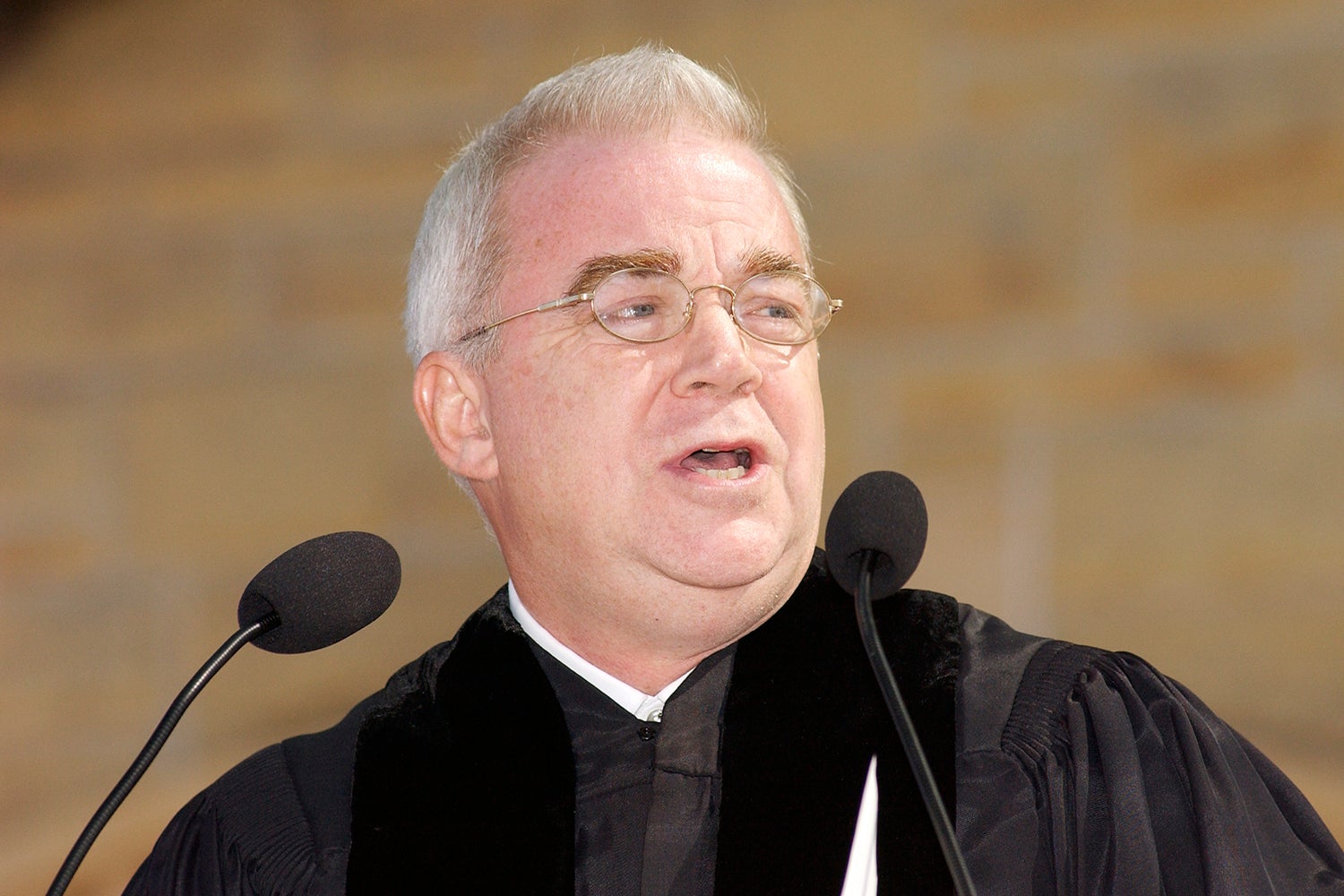At Baccalaureate, the Rev. Jim Wallis says choice is between ‘cynicism and hope’
The morning’s speakers, the Rev. Jim Wallis and graduating senior Tarek Fouad Ghani, took a global perspective in discussing topics including social justice and taking action to create a more equitable, peaceful world.
At the Multifaith Baccalaureate Celebration on the Main Quad on Saturday morning, the Class of 2004 and their families and friends heard music by Handel and Bach played by the Menlo Brass Quartet, a song sung in Zulu by Talisman A Cappella and Japanese drumming by Stanford Taiko. The service also included a Muslim call to prayer, an invocation written by a rabbi and the words of a Baha’i religious leader and the Dalai Lama.

The Rev. Jim Wallis, founder of Soujourners, delivers the Baccalaureate address. (Image credit: L.A. Cicero)
Such a range of expressions celebrates the university’s “magnificent diversity,” said the Rev. Scotty McLennan, dean for religious life, who welcomed about 3,500 graduates and their guests. The multifaith service “should feel like a feast for and of the world,” he added.
The morning’s speakers, the Rev. Jim Wallis and graduating senior Tarek Fouad Ghani, also took a global perspective in discussing topics including social justice and taking action to create a more equitable, peaceful world.
While growing up in an evangelical Christian family in the Midwest, Wallis was told that the greatest battle of our time is between “belief and secularism,” said the Washington, D.C.-based editor of Sojourners, a Christian magazine, and founder of a national federation of churches and faith-based organizations working to overcome poverty. “But I now believe the real struggle is something different. The choice in our time is between cynicism and hope. It’s ultimately a spiritual choice — and one which has enormous political consequences.”
Hope is not a feeling but a decision made on the basis of what you believe at the deepest levels, Wallis continued. “You choose hope, not as a naïve wish, but as a choice, with your eyes wide open to the reality of the world.”
The reality is that almost half the world — about 3 billion people — live on less than $2 per day and 1 billion more live on less than $1 a day, he said. Each day, more than 30,000 children die needlessly due to “utterly preventable causes — hunger, diseases due to hunger, unsafe drinking water — things we could change if we just decided that we really wanted to,” he said.
“For the first time in history, we have the information, knowledge, technology and resources to bring the worst of global poverty virtually to an end. What we do not have is the moral and the political will to do so.”
Wallis expressed his own belief that the efforts of the spiritual communities of the world could, in Malcolm Gladwell’s term, be the “tipping point” in putting the struggle against the world’s most extreme poverty into the mainstream. “I am convinced that global poverty reduction will not be accomplished without a spiritual engine. History is changed by social movements that have a spiritual foundation. This will be no different.”
If the world’s inequity “could be leveled out just a little bit, the possibilities for peace would expand enormously,” including the possibility of ending the threat of terrorism, he said. “Poverty is not the only cause of terrorism, it’s more complicated than that, with roots that are also religious, cultural and ideological. But unless we drain the swamp of injustice in which the mosquitoes of terrorism breed, there will be no defeat of terrorism.”
Wallis quoted from a diversity of figures who have spoken out for social justice through history, including the Hebrew prophet Micah, Pope Paul VI, British Chancellor of the Exchequer Gordon Brown and rock star Bono.
“Religious of not, I invite you to consider your calling more than the many opportunities presented to graduates of Stanford University,” he told the Class of 2004. “That means connecting your best talents and skills to your deepest values, making sure your head is in sync with your soul.”
His own beliefs led him away from Stanford during Winter Quarter following 9/11, said graduating senior Tarek Fouad Ghani, who was awarded a bachelor’s degree in symbolic systems. Ghani left the university for a year to assist his father, Ashraf Ghani, the finance director for Afghanistan, in the country’s reconstruction.
It was hard, not only because of the challenges he faced or the friendships he left behind, he said. “With that decision, I affirmed that there were those outside my privileged life, people who had suffered and struggled more than I could imagine, who were worth working with and living for.”
For himself and many of his classmates, “our intellectual passion has evolved into a powerful blend of idealism and pragmatism. We are audacious enough to seek a more just, a more peaceful and more prosperous world, and we are willing to find practical solutions in every discipline.”
Like many in his generation, Ghani is not religious, he said. But like many of his peers, “I share hope for a better world, I share faith in our ability to create it and I share love for the good in every member of humanity. If we are true to ourselves, these convictions are stronger than the cynicism that infects our daily lives.”
Flowers and a moment of silence at the service were in memory of Alexander Adrian Choate and Leslie Joia Hotson, who entered with the Class of 2004 but died before receiving degrees.
